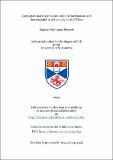Computational insights into catalytic mechanism and thermostability of the enzyme Is-PETase
Abstract
The field of study surrounding the PETase class of enzymes has gained a great deal of popularity in
the past five years. PETases are enzymes capable of degrading poly(ethylene) terephthalate and
presents an opportunity to bioanalytically recycle this common pollutant. The most extensively
researched PETase is the enzyme Is-PETase, which originates from the organism Idonella
sakaiensis and was discovered near a recycling plant in 2016. To further the utility of Is-PETase in
the industrial recycling of poly(ethylene) terephthalate, improvements in desirable properties
such as catalytic rate and thermostability must be achieved via introduction of amino-acid
substitutions to the enzyme.
In order to further improve the activity of Is-PETase, it would be informative to have a deeper
understanding of its catalytic mechanism. To this end, we have investigated the catalytic
mechanism of the degradation of poly(ethylene) terephthalate via Is-PETase. We applied hybrid
quantum mechanical/ molecular mechanical to generate several independent reaction profiles.
From these reaction profiles we have concluded that this reaction proceeds with an overall
activation barrier of 35.6 kJ mol-1
. This relatively low activation barrier suggests that the ‘true’
rate-limiting step for this reaction is a physical process such as substrate binding or product
dissociation. Our calculations provide preliminary evidence for the product dissociation step being
rate-limiting.
We have also investigated modifications to wild-type Is-PETase that contribute to the enzyme’s
thermostability. We have created our own mutant of Is-PETase, DISU-PETase, through the in silico
introduction of a novel disulfide bond. We generated reaction profiles for DISU-PETase using the
same quantum mechanical/ molecular mechanical techniques as applied to wild-type Is-PETase.
We found that introduction of the novel disulfide bond in DISU-PETase had no adverse effect upon
the reaction profile of the degradation of poly(ethylene) terephthalate. We have also applied
molecular dynamics techniques to investigate the intramolecular interactions that contribute
toward the thermostability of the most highly active variants of Is-PETase in the literature.
We have also used our quantum mechanical/ molecular mechanical techniques to generate
reaction profiles for the degradation of an alternate substrate, poly(ethylene) furanoate via wildtype Is-PETase.
Type
Thesis, PhD Doctor of Philosophy
Collections
Description of related resources
Computational Insights into the Catalytic Mechanism of Is-PETase: An Enzyme Capable of degrading poly(ethylene) terephthalate (thesis data) Shrimpton-Phoenix, E., Mitchell, J. B. O., and Buehl, M., University of St Andrews, 27 Oct 2022. DOI: 10.17630/486acc90-3be5-43c2-aa08-17c02096bb85Related resources
https://doi.org/10.17630/486acc90-3be5-43c2-aa08-17c02096bb85Items in the St Andrews Research Repository are protected by copyright, with all rights reserved, unless otherwise indicated.

